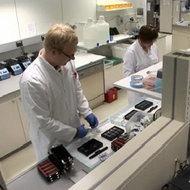 DeCodeA lab at deCODE Genetics, which found that the genetic nature of human disease was far more complex than anyone thought.
DeCodeA lab at deCODE Genetics, which found that the genetic nature of human disease was far more complex than anyone thought.
The biotechnology giant Amgen, seeking to bolster its drug discovery efforts, said on Monday that it would pay $415 million in cash to acquire DeCode Genetics, a gene-hunting firm based in Iceland and known for its headline-grabbing discoveries linking genetic variations to disease.
In a bid to bolster its drug discovery efforts, the biotechnology giant Amgen said on Monday that it would pay $415 million to acquire deCODE Genetics, a gene-hunting business known for its headline-grabbing discoveries linking genetic variations to disease.
The companies are hoping the deal will be symbiotic. DeCODE will get a well-financed partner to further its research, while Amgen is hoping to capitalize on the cutting-edge findings.
DeCODE, a privately held company in Iceland, has studied the local population to identify genetic variations linked to schizophrenia, cancer and numerous other diseases. Just this year, it published a study identifying a rare mutation that protects people from getting Alzheimer’s disease, a second on a mutation that significantly raises the risk of Alzheimer’s, and a third suggesting that older men are more likely to father children with autism.
Despite its research efforts, deCODE has had trouble building a sustainable business, and it filed for bankruptcy protection in 2009. It was bought out of bankruptcy in 2010 by Saga Investments, a group led by two venture capital companies, Polaris Venture Partners and Arch Venture Partners.
A big issue for deCODE has been how to make money from its discoveries. Most of the genetic variations raised the risk of getting a disease by only a small amount. That meant there would be little demand for diagnostic tests to detect those variations.
But identifying the gene provides clues to the mechanism of the disease, which pharmaceutical companies might use. DeCODE never really had the financial wherewithal to develop drugs and it dropped its fledgling efforts when it emerged from bankruptcy.
Amgen, the world’s largest independent biotechnology company, says it believes it can use deCODE’s findings and technology to its advantage.
Dr. Sean Harper, Amgen’s executive vice president for research and development, said in an interview that drugs based on findings from animal models often did not work, but products based on human genetic discoveries had a better track record. Two of the most exciting experimental drugs in Amgen’s pipeline — one for osteoporosis and one for high cholesterol — come from human genetic studies.
“We’re looking for more of that confidence, more of that ability to pick the winners,” Dr. Harper said. He said Amgen had already dropped some targets based on published findings from deCODE.
Geoffrey Porges, an analyst at Sanford C. Bernstein, said in a note on Monday that while deCODE had good science, the payoff for Amgen in terms of bringing drugs to market would likely be five to 10 years away.
The deal is expected to close this month.
DeCODE was founded in 1996 by Kari Stefansson, a neurologist who had taught at the University of Chicago and Harvard. Dr. Stefansson realized that Iceland, his native country, would be an ideal place to perform studies in an attempt to detect genetic variants that raise or lower the risk of various diseases. Iceland has good medical and genealogical records and a population that is not very diverse genetically.
Dr. Stefansson, who remained chief executive of deCODE during the bankruptcy, said in an interview on Monday that he would continue to run the business as a subsidiary of Amgen. He said that deCODE would still publish its genetic findings in medical journals, rather than keeping them as secrets for Amgen. Sales of deCODE’s diagnostic tests are to be halted, he said.
Dr. Stefansson said Amgen would help turn deCODE’s discoveries into products. “From the point of view of proving to the world that this kind of genetics can lead to tangible benefits, this is extraordinarily good news,” he said.
The deal seems to be lucrative for Saga Investments, which paid $13.9 million for the company, according to Mr. Porges of Sanford Bernstein, who attributed that information to Capital IQ. DeCODE then raised $5.1 million in September 2011 from Hercules Technology Growth Capital, a publicly traded venture firm, Mr. Porges wrote in his note.
Terry McGuire, a co-founder and general partner of Polaris, said he did not have the exact figures but said that Saga spent about $50 million, including the purchase price and the money needed to run deCODE. He said Polaris and Arch each owned a little less than a third of deCODE.
This post has been revised to reflect the following correction:
Correction: December 10, 2012
An earlier version of this article misspelled the name of deCODE’s founder. He is Kari Stefansson, not Stefannson.
Article source: http://dealbook.nytimes.com/2012/12/10/amgen-to-acquire-gene-hunting-firm-decode/?partner=rss&emc=rss